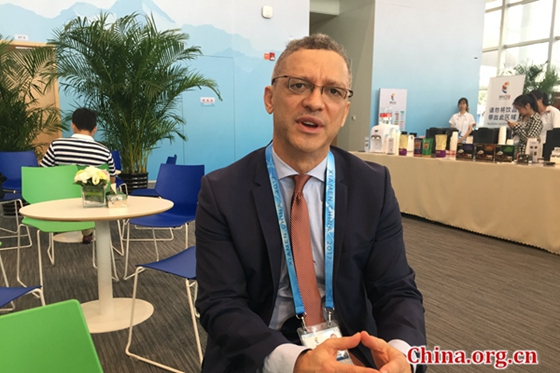NDB drives green economy in BRICS and beyond: NDB's VP
By Guo Yiming
The BRICS New Development Bank (NDB) will focus on green development within the bloc and in other emerging economies over the next few years, NDB's vice president told China.org.cn on Monday on the sidelines of the on-going BRICS summit in Xiamen.

Leslie Maasdorp, vice president and chief financial officer of the BRICS bank, said the bank will work to ensure that all the projects it funds are green and have taken into account the long-term environment implications.
Founded in Shanghai on July 21, 2015, the bank was established by Brazil, Russia, India, China and South Africa, the five emerging economies, as the brainchild of the BRICS mechanism.
Ahead of the BRICS summit, the bank has approved US$1.4 billion loans for sustainable development projects in China, India and Russia in late August, which, in the bank's president K.V. Kamath's words, "is fully in line both with the national development agenda in member countries and the NDB's mandate of mobilizing resources for infrastructure and sustainable development."
In the wake of the U.S. decision to withdraw from the Paris climate deal, Maasdorp calls for leadership in tackling climate change and sustainable development.
"China is playing a significant role in changing its policy and regulatory environment to ensure that the transition to the green economy does indeed happen."
"At the moment, all of our projects are green," he said and was confident the momentum will maintain into the future.
Chinese President Xi Jinping announced plans to inject US$4 million into a project preparation fund to support NDB's operation and long-term development.
During the BRICS Xiamen Summit between Sept. 3 and 5, China has also held the Dialogue of Emerging Market and Developing Countries, where leaders of Egypt, Guinea, Mexico, Tajikistan and Thailand joined the BRICS leaders in discussing global development cooperation and South-South cooperation.
With the BRICS mechanism inviting more countries on board, the NDB is also set to expand, said Maasdorp.
At the same time, the bank will continue to strengthen its work in infrastructure development, and embrace new technologies and new ideas.
Besides direct investment and loans, the BRICS bank may also need to direct private capital to certain sectors, like green energy, which is in accordance with its agenda, through partnership measures to bridge financing gaps, said Qian Jing, vice president of Jinko Solar, the world's largest solar panel producer by shipments.
He also suggested the need for innovative financial instruments such as green bonds as well as the introduction of a green rating system to reduce financing costs for the sector.
"As our technology develops, we want to be a fast adopter of new ideas, which will help us become faster, more efficient, productive in the way we deliver our mandates," Maasdorp said.